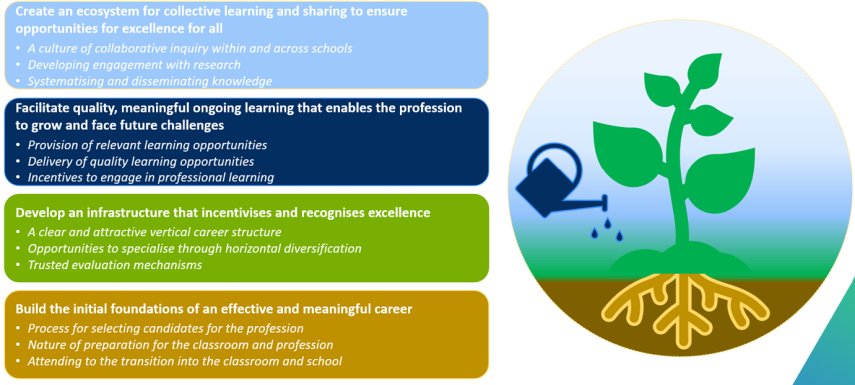Reimagining teacher professional learning in Ukraine
In a conference centre in central Kyiv in May, education leaders and policymakers discuss teacher professional learning in Ukraine, conscious that a siren could interrupt at any minute warning of a Russian drone attack or missile strike threat.
After years of war, these leaders – like the rest of the country – are tragically used to this. But it does not stop them from reimagining education in the country, and real transformation is often born in deep crisis.
EdCamp Ukraine, a civil society organisation at the heart of the country’s education transformation, provides the platform where ministers, prominent academics and educators, as well as experts from other countries, work together to grapple with some of the most complex challenges in professional learning. We are discussing ways to better recognise and reward teachers throughout their careers, and to reevaluate the types of supports they need at different stages of their teaching journey.
The agenda is ambitious, and so too the vision of the stakeholders – but that is not surprising. Despite the conflict, Ukraine has shown a remarkable tenacity and willpower to transform its education system through the New Ukrainian School reform.
Multiple routes into the profession
Building on OECD evidence for professional learning, we discussed how a strong teaching profession begins with attracting the best possible candidates and providing them with quality preparation.
Whilst historically we have tended to primarily think about a series of specific ‘hoops’ for new teachers to jump through, policymakers across systems now also need to ensure that there are multiple routes for new teachers to enter the classroom. This is because it is now far more common for young people to imagine having multiple careers, but it is also a reflection of the diversity of skills that we expect our classrooms to nurture. Building strong digital literacy, social-emotional skills and climate literacy may mean finding ways of supporting individuals with existing expertise in these fields to become teachers.

[Image: OECD] View a larger version of this graphic
Supporting and nurturing teachers from day one
Teacher education that provides real experiences in the classroom, supported with ongoing mentoring and coaching from expert teachers, is essential for all teachers, regardless of their initial pathway to the classroom. It is also about supporting the holistic development of teachers from day one; nurturing teachers’ sense of purpose and their ability to research, collaborate and reflect.
These can provide teachers with a ‘compass’ to navigate the complexities and demands of teaching as their careers progress. This is something we see leading systems such as Singapore and Finland – both of whom shared their experiences with Ukraine – place great emphasis on.
Building a strong teaching profession is also about ensuring that from day one there are both opportunities to grow, and recognition of this. A clear and attractive career structure underpins this; one that incentivises and rewards excellence, but that also offers a degree of agency and choice.
Teaching is inherently complex, and it means that opportunities for rich collaborative professional learning can be essential too. Yet, data from TALIS (Teaching and Learning International Survey) 2018 suggests that few countries regularly see this type of deeper, collaborative learning (OECD, 2019). This isn’t just significant for teachers’ learning, but the attractiveness of the profession.
Extraordinary teacher support for students
The desire to learn, grow and share underpins what Ukraine is trying to do. According to data from the Programme for International Student Assessment (PISA), between 2018 and 2022, performance in Ukraine’s 18 regions in mathematics fell less than the OECD average, despite the unprecedented disruption to learning (OECD, 2023).
Similarly, the OECD’s most recent Survey on Social-Emotional Skills suggests that 15-year-olds in Ukraine feel better at school than in most participating cities/countries, reflecting the care and attention they receive from their teachers amidst the war. Although they report less motivation than the average, Ukrainian 15-year-olds report having felt more confident, less anxious and less angry while at school, compared to almost all other survey locations, (OECD, 2024). It’s a reminder of how schools can be a sanctuary.
While we can rarely drag and drop policies from one context to another, we also don’t always need to reinvent the wheel. There is inspiration out there and Ukraine’s efforts to reimagine the professional learning journey of its extraordinary teachers is a reminder to us all: the strength of an education system depends on the strength of its teaching profession.
References
OECD. (2019). TALIS 2018 Results (Volume I): Teachers and School Leaders as Lifelong Learners. TALIS, OECD Publishing, https://doi.org/10.1787/1d0bc92a-en.
OECD. (2023). PISA 2022 Results (Volume I): The State of Learning and Equity in Education. PISA, OECD Publishing. https://doi.org/10.1787/53f23881-en.
OECD. (2024). Nurturing Social and Emotional Learning Across the Globe: Findings from the OECD Survey on Social and Emotional Skills 2023. OECD Publishing. https://doi.org/10.1787/32b647d0-en.



